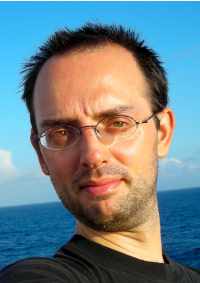Sedimentological expression of Cenozoic climate events 17-21 March 2025
Veranstalter: Thomas Westerhold
The Cenozoic era, the Age of Mammals, which started with the demise of the Dinosaurs, spans the past 66 million years. Earth’s climate underwent a significant and complex evolution during the Cenozoic. One of the best and continuous paleoclimatic archives of this era come from deep-sea deposits or sediments. For more than 50 years now, in the world’s largest and longest international scientific endeavor, deep-sea sediments have been drilled by the International Ocean Discovery Program (IODP) and its predecessors. Major international scientific collaborative efforts investigated the sedimentary records and revealed, amongst many other findings, important details about the Cenozoic climatic evolution. The records showed gradual trends of warming and cooling driven by tectonic processes on time scales of 1 to 10 million years, rhythmic or periodic cycles driven by orbital processes with 10.000 to 100.000-year cyclicity, and rare rapid shifts and extreme climate events with durations of 1.000 to 100.000 years.
The given course will introduce to scientific methods and findings from scientific ocean drilling. It will focus on the sedimentological expression of outstanding climate events, their relation to astronomical forcing and their implication for future climate pathways. During the course Atlantic IODP sediment cores stores at the Bremen Core Repository will be investigated. Students will obtain a broad perspective on the Cenozoic climate evolution and insights into the (feedback) mechanisms that govern climate and carbon cycle dynamics.
- acquire visual core description techniques as carried out by sedimentologists on sea-going paleoceanographic cruises
- provide an overview of the climate evolution of the Cenozoic
- study selected extraordinary climate events during the past 66 million years in detail
- discover the mechanisms that altered climate and carbon cycles dynamics
- advanced skills in literature review, scientific writing and presentation by supplementing sedimentologic observations, findings from proxy records and numerical modeling to gain a comprehensive understanding of the studied events
15 minutes conference-style talks and ~5-page scientific article style report (in groups of 2-3)
Referat mit schriftlicher Ausarbeitung
will be announced
1st Tag: Introduction in Cenozoic climate changes and carbon cycle dynamics
2nd Tag: Core laboratory exercise and investigations
3rd Tag: Core laboratory exercise and investigations
4th Tag: Core laboratory exercise and investigations
5th Tag: “Scientific Conference” with presentations of the participants
6th Tag:
7th Tag:
8th Tag:
9th Tag:
10th Tag:
11th Tag:
12th Tag:
13th Tag:
14th Tag:
Eckdaten
05-MMG-PG2-5
Studiengang
Master Marine Geosciences
Modulname
Field and Lab Practice I
Veranstaltungsart
Blockkurs (BK)
First Year of Study
3 CP
3 SWS
Summer Term
Kurssprache(n)
nur Englisch
Ansprechpartner

Forschungsprofessur – Meeresgeologie
Dr. Thomas Westerhold
MARUM1 0220R
Tel.: +49 421 218 - 65672
twesterhold marum.de
marum.de
Forschungsprofessur – Meeresgeologie
Dr. Thomas Westerhold
MARUM1 0220R
Tel.: +49 421 218 - 65672
twesterhold marum.de
marum.deVeranstalter

Forschungsprofessur – Meeresgeologie
Dr. Thomas Westerhold
MARUM1 0220R
Tel.: +49 421 218 - 65672
twesterhold marum.de
marum.de
Forschungsprofessur – Meeresgeologie
Dr. Thomas Westerhold
MARUM1 0220R
Tel.: +49 421 218 - 65672
twesterhold marum.de
marum.de
